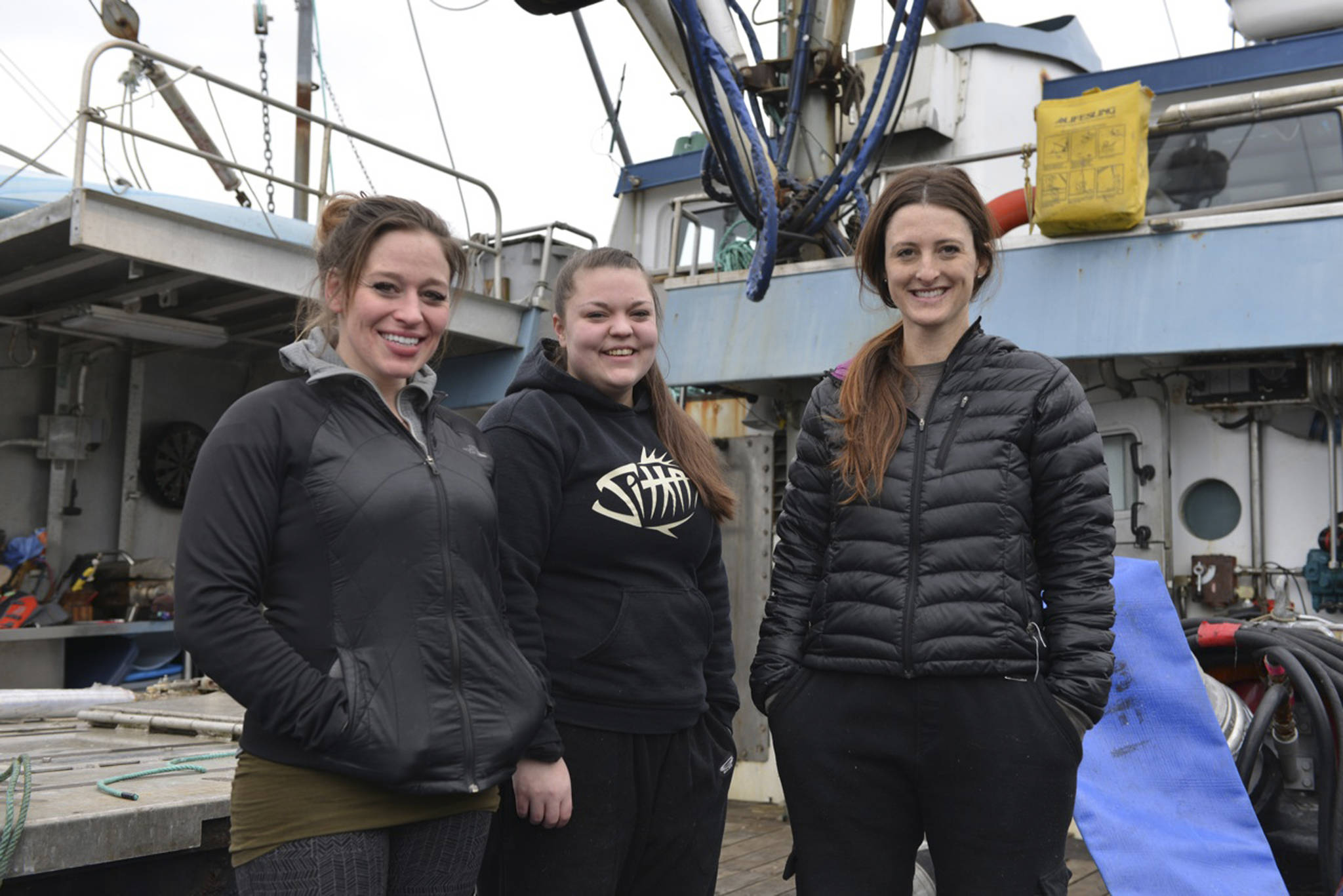SITKA (AP) — On a door of the F/V Kamilar is a sticker with pink script: “Girls fish too.”
And in the case of this boat, it is girls only.
Vessel owner Brannon Finney is captaining the tender for the Sitka, Alaska, sac roe herring fishery with her all-female crew — something that’s rare for the fast and frenzied commercial fishery.
Finney’s rotating crew is comprised of cousin Kelsey Kubik of Sitka; Bettina Nichols of Astoria, Oregon; Sandra Coats of Ketchikan and Annea Martinsen of Petersburg. They are packing for Petersburg’s Icicle Seafoods.
“Tendering is usually really easy,” the 30-year-old long-lashed captain said. “You drop anchor and wait until the boats come to you.”
But tendering for herring in the Sitka Sound sac roe fishery is different, she said. With so many boats in such a small area, the tender boats have to maneuver around a lot of obstacles.
“Picking through nets and boats is so challenging, especially with the stakes being so high,” she said. “Everybody is trying to make a million dollars in a day.”
The fishery went on two-hour notice this morning, and Finney expects it to open soon. She spent all day Thursday working on her deck, positioning dewatering gear, hooking up hydraulic hoses, testing the herring pump and strapping gear down.
“From the samples they took from the roe it looks very likely,” she said about the prospects for an opening shortly.
She grew up fishing in Ketchikan and Petersburg, but she has ties to Sitka. Her maternal grandfather, Bill Carr, was involved in the Sitka sac roe herring fishery in the late 1970s, and her paternal great-grandfather was Leslie Yaw, one of Sitka’s most prominent citizens and superintendent of Sheldon Jackson School for many years.
Finney is thoroughly comfortable fishing, having spent so much time learning the ropes of the industry, but leading her own crew is a more recent venture.
“It’s new because I’ll be in the captain’s chair,” she said, adding, “I always said I’m just too bossy to be on the back deck.”
After high school Finney headed to Pacific University in Oregon to study international politics. But looking at those problems on a macro-level became almost too overwhelming, she said, so she decided to focus on her happiness at a micro-level and her life on fishing.
“There’s a lot of pride in this work,” she said. “You’re feeding people and you can see the product of your work instantaneously.’”
Her original plan was to buy a seine boat.
“I was becoming more and more invested in the industry and bought a seine permit,” Finney said. “But I decided I really liked tendering. I sold the seine permit for a down payment on this boat.”
The way fishing has been the past couple of seasons she’s thankful she got out of seining, she said.
“I had missed an opportunity to buy a seine boat two years ago and I’m really glad I did,” Finney said. Her present boat is suited for other types of commercial fishing, however: she plans to longline in the spring, tender in the summer and crab fish in the fall.
She closed on the light-blue boat in September and has plans to change the name to Alaskan Girl.
“Who doesn’t love an Alaskan girl?” she said.
And the boat truly reflects that name. She remodeled the captain’s quarters to make it a little more cozy and added a closet. The wheelhouse is decorated with twinkle lights, and herb plants — parsley and rosemary — dot the window. She plans to put a vanity for nail polish and makeup on top of her toolbox in the galley, she said.
Finney also installed a decorative backsplash in the galley, and always has her mint Kitchenaid mixer ready to go.
“We make cookies and stuff for people who deliver to the boat,” she said with a smile. “That way I get my Pinterest fix without eating them all.”
Finney said she has experienced sexism while commercial fishing. Sometimes it’s been hard to get a job on a boat because male captains don’t want to hire women, she said. They are afraid a female would ruin the male camaraderie on the crew or be incapable of doing the work. But that’s not the case, she said.
“I feel like we thrive in this industry because of our sex not in spite of it,” she said.
The captains she has worked for have told her they’ll never opt-out of hiring a female again, Finney said, because of her attention to detail, cleanliness and ability to keep the men in line.
“Sexism is a problem but it’s not a deterrent to pursuing this job,” she said.
She said she didn’t intend on hiring an all-female crew but it just worked out that way. Her employees are all well-qualified for the job, she said, having experience working on other boats.
There’s one more member of the crew — a blue heeler named Amigo.
“He’s the only male on board,” Finney said.
When not working, Finney enjoys traveling, practicing yoga, reading, canning and wildlife photography.
“A lot of our job tendering is running back and forth to the plant,” she said. It’s during those trips she gets to see pods of whales or migrating seabirds, which makes the job really special, she said.
“It’s really great getting paid to do something that some people pay to do,” Finney said.

